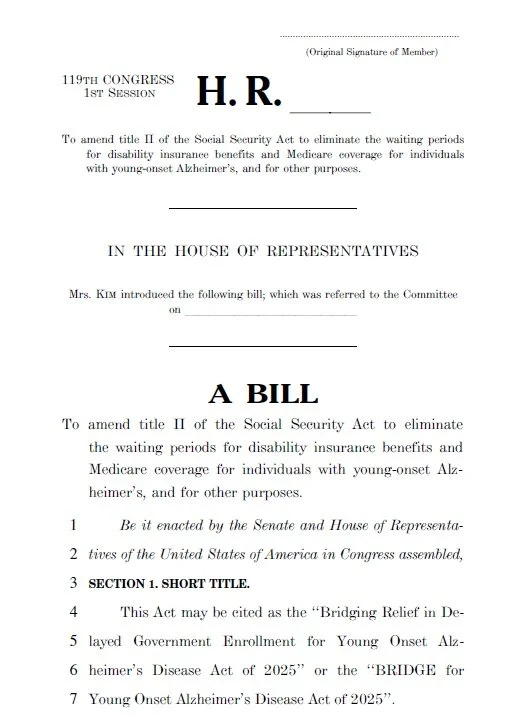
Support the Bridging Relief in Delayed Government Enrollment (BRIDGE) for Young Onset Alzheimer’s Disease Act of 2025 (HR 6799)
Individuals with young-onset Alzheimer’s disease - those diagnosed before age 65 - currently endure a 29-month Medicare waiting period, depriving them of timely access to critical early-stage treatments.
Voices of Alzheimer’s is leading the charge to end these harmful delays. Through advocacy, public awareness, and policymaker engagement, we’re demanding legislative action to eliminate waiting periods for SSDI and Medicare coverage.
Congress must act now. Join us in the fight.
“Delaying access to treatment isn’t just a bureaucratic hurdle—it costs lives, livelihoods, and hope for families racing against a narrow window of opportunity.”
A CONGRESSIONAL CALL FOR CHANGE
Progress in Action: BRIDGE for Young Onset Alzheimer’s Disease Act of 2025 (HR 6799)
Following the united call from advocates and families, Congress has taken the next step. The Bridging Relief in Delayed Government Enrollment for Young Onset Alzheimer’s Disease (BRIDGE) Act was introduced in the U.S. House of Representatives by Rep. Young Kim (R-CA).
The bill would eliminate the five-month waiting period for Social Security disability benefits and the 24-month delay for Medicare coverage for individuals diagnosed with young-onset Alzheimer’s.
Advocates
THE ISSUE
Young-onset Alzheimer’s refers to Alzheimer’s diagnosed before age 65 and affects approximately 200,000 Americans, many in their highest-productivity years.
People with young-onset Alzheimer’s face unique challenges, including a statutory two-year wait for Medicare coverage after being deemed qualified, leaving them without essential healthcare during a critical time.
The Misconception of Alzheimer's Age Range:
While Alzheimer's is commonly associated with individuals aged 65 and older, a significant population of over 200,000 Americans under 65 are also affected by "young-onset Alzheimer's disease," leading to unique challenges due to their age.
The Disparity in Social Security and Medicare Access:
The Social Security Administration (SSA) prioritizes SSDI (Social Security Disability Insurance) applications for young-onset Alzheimer’s through the Compassionate Allowance program. However, Medicare still requires a two-year wait for coverage, even after someone qualifies for SSDI. Medicare has set aside this precedent for other chronic conditions, notably ALS, and should do so again.
The Impact of Delayed Medicare Coverage
The two-year wait for Medicare coverage, based on outdated rules from the 1970s, leaves people with young-onset Alzheimer’s without vital healthcare. This gap makes their struggles even harder now that there are treatments that may help - but only at the earliest stages of the disease.
THE BACKGROUND
The wait for Medicare coverage is especially harmful to people with young-onset Alzheimer’s disease. Shockingly, the long wait time makes up half of their remaining life expectancy. This is a serious problem because there is only a short period in the early stage of Alzheimer’s when treatment is most effective.
Since 2022, the FDA has approved three new drugs that slow the progression of young-onset Alzheimer’s. However, these treatments are only meant for patients with mild cognitive impairment or early-stage dementia. Under current laws, people with young-onset Alzheimer’s who qualify for Social Security Disability Insurance (SSDI) could go without insurance for the first three years after diagnosis. This means they wouldn’t have coverage during the time when these new treatments work best. Medicare’s actions not only limit patient access to care but also contradict efforts to improve healthcare efficiency—a key priority for both patients and the current Administration.
Congress has previously waived Medicare’s waiting period for conditions like ALS and End-Stage Renal Disease (ESRD). People with young-onset Alzheimer’s deserve the same timely access. Without coverage, many people under 65 with young-onset Alzheimer’s delay treatment until their condition gets worse, leading to preventable medical emergencies.
THE SOLUTION
-
Congress must eliminate both the 5-month SSDI waiting period and the 24-month Medicare waiting period that follow eligibility, ensuring continuous insurance and access to treatments.
Access to Time-Sensitive Treatments
Allowing young-onset Alzheimer’s patients eligible for SSDI to access time-sensitive treatments before they progress into moderate disease stages is crucial for maintaining treatment effectiveness.
Economic and Workforce Impact
Young-onset Alzheimer’s often strikes in people’s 40s and 50s—prime working years. Early access to treatment can slow decline, allowing patients to remain employed longer, maintain employer-sponsored insurance, and delay reliance on disability benefits. Each additional year of work by YOAD patients saves Medicare an estimated $10,000–$14,000 per person annually, while preserving tax contributions and easing financial strain on families.
Fiscal and Compassionate Responsibility
Eliminating the Medicare waiting period is not only compassionate, it’s smart economics. Early treatment reduces costly hospitalizations, prevents premature nursing home placement, and lessens reliance on Medicaid long-term care. These changes would save billions in avoidable costs to both federal and state programs while improving quality of life for families.
Improved Functionality and Caregiver Support
Medicare coverage allows younger patients to maintain functionality longer and delays their exit from the workforce, thus decreasing reliance on disability benefits. It also supports caregivers, enhancing their employment opportunities and ensuring comprehensive management of Alzheimer’s-related health issues.
RESOURCES
-
-
-
Letter signed by advocates and leaders urging Congress to eliminate the outdated 29-month Medicare waiting period for individuals diagnosed with young-onset Alzheimer’s.




